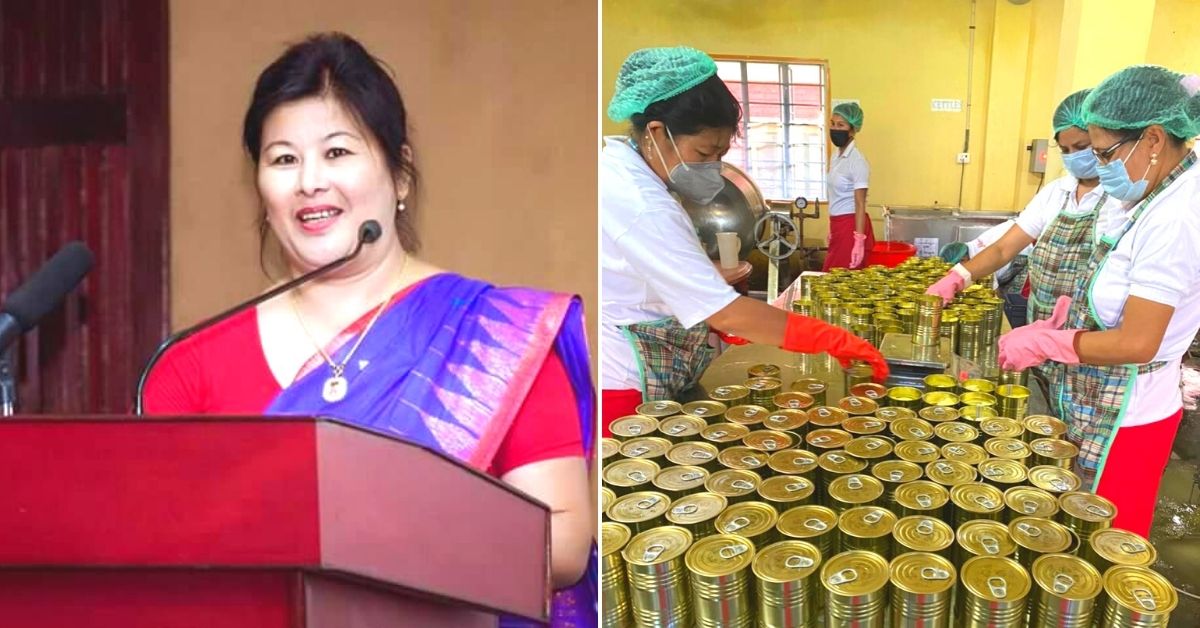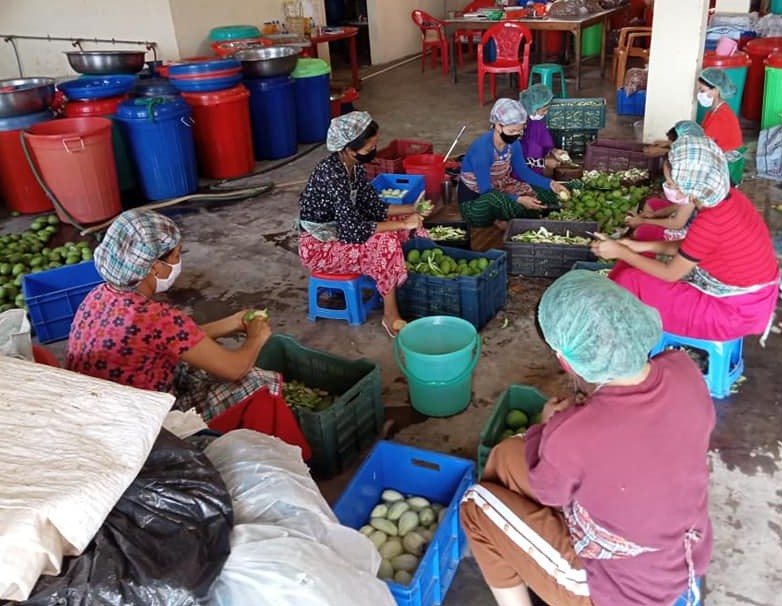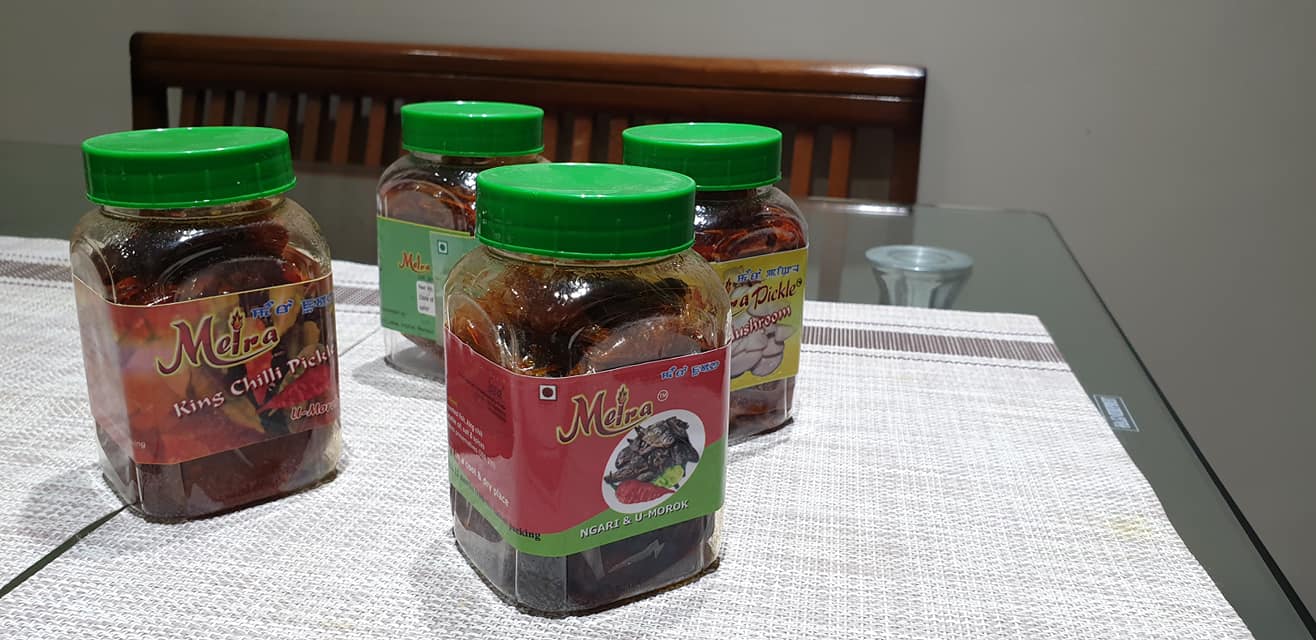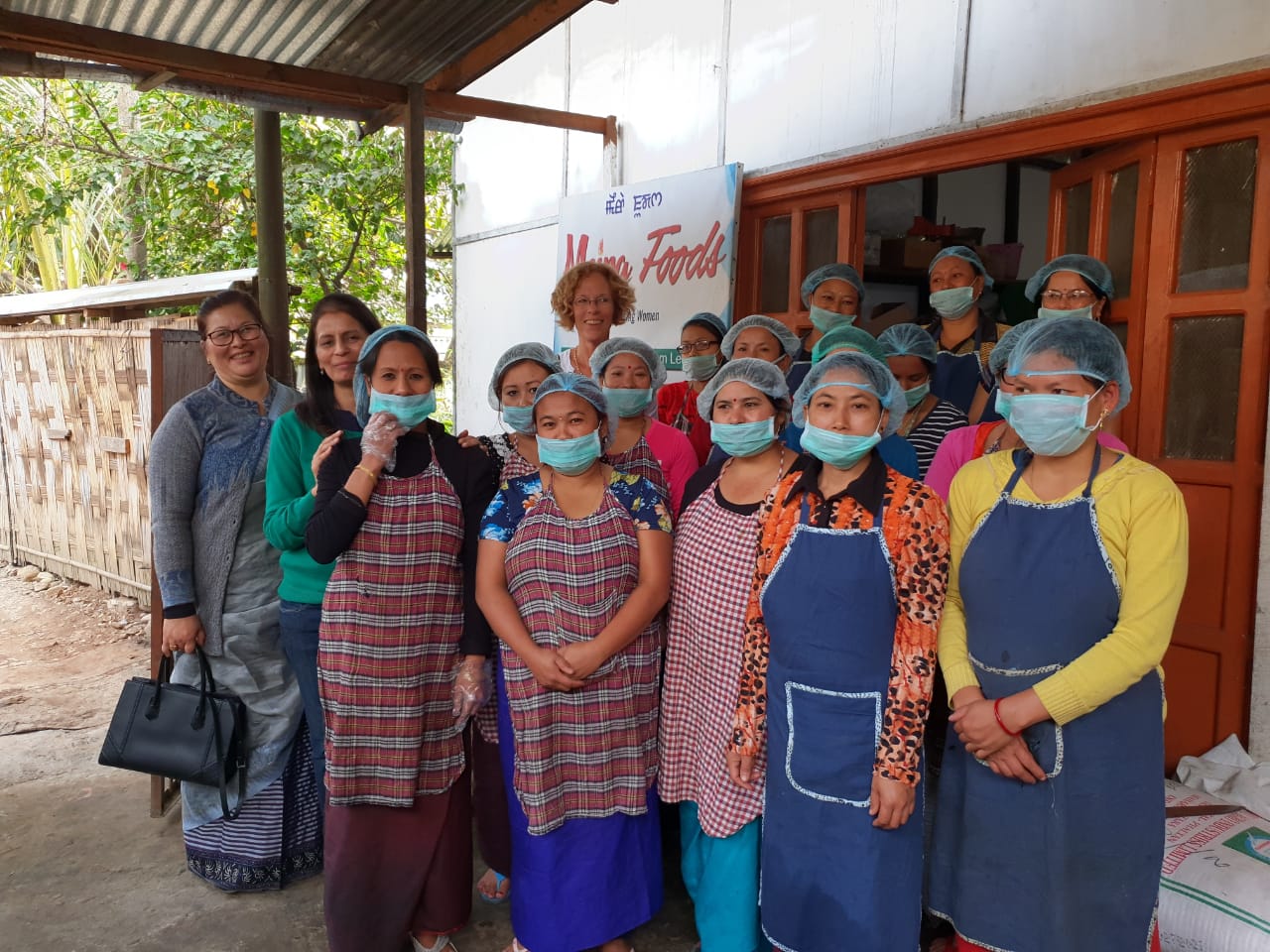With Pickles & Pineapples, Manipur Woman Uplifts 70 Others; Earns Crores in Turnover
Hanjabam Shubhra Devi started Meira Foods, a small packaged foods venture, from her kitchen in Bamon Leikai, Imphal East. They sell 45 different items, including a variety of candies, pickles and salted dry fruit.

In January 2004, Hanjabam Shubhra Devi started Meira Foods, a small packaged foods venture, from her kitchen in Bamon Leikai, Imphal East. (Shubhra Devi on the left. Meira Foods makes pickles, candies, salted dry fruits, etc.)
Prior to Meira Foods, the Master’s degree holder in food and nutrition from Banasthali Vidyapith, Rajasthan, was running a non-profit called Action for Community Transformation Manipur (ACT-M). They worked with MSMEs (micro, small and medium enterprises) in Manipur to enhance their capacity and skill in food processing and other employment generation activities.
Despite training over 30 women from low-income households in Manipur and spending a decade working in the development sector, Shubhra wasn’t satisfied with the results on the ground.
That’s when she started her own venture with just a few hundred rupees and a group of three women from the lot she trained to leverage the vast availability of indigenously grown wild fruits and vegetables.
In fact, long before companies like Dabur, Hamdard and Patanjali sold candies made of Indian gooseberries (amla), Meira Foods did the same with locally-found wild gooseberries.
Today, the venture earns an annual turnover of a few crores of rupees. But, more importantly, directly employs 70 women from largely poverty-stricken homes, and many more indirectly, for the sale of 45 different items which includes a variety of candies, pickles and salted dry fruits. These items are made of organic fruits and vegetables purchased from local farmers, sellers and suppliers, which in turn, has spawned a whole new supply chain associated with her burgeoning business.

Tapping into Manipur’s Riches
Expertise in traditional cooking, Shubhra feels, translates well in the business of food processing. In other words, cooking can translate into economic opportunities that are beyond the staple of government jobs and work in the state’s traditional handloom-handicraft sector. With the economic freedom that comes from running a sustainable venture, women have a larger say in the affairs of their family, she claims.
“Working in the development sector, the women approaching me were poor and in need of alternative livelihoods. What could they do to meet their basic needs? While working with various organisations as a training coordinator, I imparted many ideas about how they could start a venture in food processing instead of the more sought-after handicraft and handloom sector, for which 99% of raw materials are sourced from outside Manipur. In the handlooms and handicrafts sector, only those with real expertise and skill can earn in a sustained manner. Despite giving a lot of ideas, they never started any venture in food processing. After all, it’s not easy to start a venture in a sector not many knew about back then,” says Shubhra.
With an academic background in food and nutrition, she worked with some food entrepreneurs and experts in the field. Given the availability of wild fruits and vegetables in the state, which hadn’t been tapped into economically, she decided to set an example.
“There is massive availability of indigenous fruits like wild amla (rich in Vitamin C)—a resource which hadn’t been tapped into—and vegetables. The next step is to organise people to gather the fruit, which secures one form of livelihood. By processing it, along with value addition, you’re able to generate further employment,” explains Shubhra.
“What we’re doing is more than Meira Foods. It’s a model we are creating — people can learn from what we have done so far. I wanted to create a sustainable livelihood model for the women of Manipur, whereby they could sit at home, utilise resources locally available, consume good food and earn a livelihood,” she adds.
Meira Foods began by making dry amla, which locals popularly consumed as a mouth freshener. Cutting the fruit in half, locals would mix it with salt and sun-dry it before consuming the mouth freshener.
Following this, Meira Foods ventured into making amla candy made of smaller varieties of wild gooseberries preserved in sugar. The only difference between their amla candy and the one made by the likes of Dabur is that the latter uses larger hybrid varieties of gooseberries, claims Shubhra.
After amla candy, her venture proceeded to introduce amla powder and pickles. This was followed by wild apples, from which they made candy and salted dry fruit. Their initial success among buyers in the local market, however, wasn’t enough for Shubhra. After all, once these buyers knew how to process them, they might as well make it at home.
The objective was to introduce these products of people living outside the state interested in food from the Northeast and organically grown natural foods. This led them to participate in various food exhibitions in 2006, where people from outside Manipur could taste their products.
For their first food producers exhibition, which was organised by the North Eastern Development Finance Corporation (NEDFi) in Guwahati, they carried products that they thought would last them 10 days. However, they ran out of stock on their first day. Such was the demand for their candies, pickles and salted dry fruit. They enjoyed a similar overwhelming response during the International Trade Fair the same year at Pragati Maidan in New Delhi. These exhibitions really inspired Shubhra and her team of three employees to really ramp up production.
“I wanted to deliver a very special pickle from our land,” she says, adding, “My next target was the King Chilli, which we call U-Morok, and is abundantly available in Manipur. Even to this day, we are known for our King Chilli pickle, and soon diversified to King Chilli with fermented fish and fermented soybean pickles. At home, we make chutney mixing King Chilli with either fermented fish or fermented soybean. What we did was convert that into pickles so that people could carry it anywhere — while travelling or living in other parts of India or abroad.”

“To this day, we generate our maximum revenue through our King Chilli range of pickles. We also introduced bamboo shoots, since as you know that Manipur is rich in varieties of bamboo. We have been processing fermented bamboo shoots into different forms,” she says.
Found widely along the Manipur-Myanmar border and the Kakching area, where Meira Foods today runs a cold storage and processing unit, these bamboo shoots are converted into pickles. “Fermented bamboo shoots possess a very strong taste and smell, which often puts off many non-locals. Once these bamboo shoots are converted into pickle form, it tastes quite different and more acceptable to markets outside Manipur,” adds Shubhra. Other popular pickles under the Meira Foods brand include those made of organic mushroom and fish.
In the past two years, the venture has been developing a new line of products made of organic pineapple dedicated to the export market. Even though it’s a small quantity, buyers outside the state and country have started placing orders. Meira Foods is working closely with the Manipur Organic Mission Agency to expand their production, and have tied up with a Farmer Producer Organisation (FPO) to source certified organic pineapples directly from them.
Out of these organic pineapples, they are making candies, osmo-dehydrated pineapples, cane pineapple in different sizes, dried pineapple and pineapple jam and squash.

All Women Enterprise
Besides her home at Bamon Leikai (‘Leikai’ — traditional socio-cultural spaces), Shubhra runs production units in Imphal East on a piece of land near her maternal home and Kakching. Among the three production units she runs, the one in Kakching, which lies 45 km away from Imphal, is the largest and holds a key advantage. The farmers and fruit orchards from where Meira Foods source their raw items largely lie in the vicinity of their Kakching unit.
“Besides the 70 women we employ, we are also adopting smaller women-run self help groups which have received training from us. We advise them to make certain items in high demand. Instead of looking for a market to sell their products, we buy their products and help market them as well. We also support 10 such SHGs. Indirectly, we are giving employment opportunities to more than 100 people,” claims Shubhra.
Most of the women she directly employs are either school or college dropouts who come from low-income families. However, as the venture grew, more formally educated people were needed on the management and accounting side. In the past few years, women with college degrees, MBAs and expertise in food technology have also joined the workforce.
What’s particularly heartwarming about this venture is constant training of the workforce coming from underprivileged backgrounds. Freshers are trained by the seniors and within a year, they become master trainers for the next set of new joinees. These women work in groups and bring their products to the marketing unit in Bamon Leikai.
Today, Meira Foods is very popular among young Manipuri students and working professionals living outside the state as well, giving them the comfort of home away from home with their pickles, candies, etc. Beyond them, the venture sells their products to all major metropolitan cities and other states in the Northeast.
“Today, we are looking for a like-minded partner who can invest large sums into technology and machinery so that we can operate a full-fledged factory in Manipur,” she says.
Of course, since she started her venture, awards and recognitions haven’t lagged far behind.
She won the FICCI 2018 Outstanding Entrepreneur and received special recognition from the National Small Industries Corporation as well. However, for Shubhra, this is just a small part of a much larger journey and she is determined to take Manipuri flavours to many more destinations.
(Edited by Yoshita Rao)
Like this story? Or have something to share? Write to us: [email protected], or connect with us on Facebook and Twitter.
If you found our stories insightful, informative, or even just enjoyable, we invite you to consider making a voluntary payment to support the work we do at The Better India. Your contribution helps us continue producing quality content that educates, inspires, and drives positive change.
Choose one of the payment options below for your contribution-
By paying for the stories you value, you directly contribute to sustaining our efforts focused on making a difference in the world. Together, let’s ensure that impactful stories continue to be told and shared, enriching lives and communities alike.
Thank you for your support. Here are some frequently asked questions you might find helpful to know why you are contributing?


This story made me
-
97
-
121
-
89
-
167













